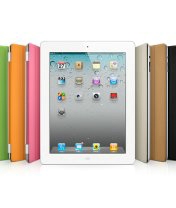2011 - The Year in Review: iOS, Android, Windows Phone
Upwardly mobile

2011 kicked off with both Motorola and LG unveiling the world's first dual-core tablets and phones - an early indication of where most mobile manufacturers were heading this year.
In February, we also got the first glimpse of Google's latest Android OS, codenamed Honeycomb, built specifically for tablet machines such as the Motorola Xoom. Alas, despite some impressive technology and the attractive-looking OS, the Xoom failed to set retailers alight.
In 2011, in fact, quite a few major companies were given a rude reminder of how competitive the mobile industry can be, with HP's TouchPad tablet dying months after it launched.
And so, it fell to a familiar face to head up the tablet market this year.
iPad 2, iPhone 4S, and Steve Jobs

Apple had another good, if unsurprising, year when it came to both tablets and phones.
The start of 2011 was dominated by news of the iPad 2, the first of the company's iOS devices to pack the dual-core A5 processor.
While the thinner, more powerful machine didn't cause too much of a shock in terms of design, that didn't stop the Pocket Gamer Gold Award-winning machine racking up 32.39 million sales - far outstripping its nearest competitors for most of the year.
The biggest shock was reserved for the iPhone 5 - or, rather, the lack of it. Having missed its traditional summer announcement and launch window for a new model of iPhone, Apple confounded everyone (not least those saying it would launch two new iPhones at once) by revealing the iPhone 4S.
While critical reaction from many quarters of the tech press was fairly restrained given the relatively incremental design changes (and the fact it used exactly the same chip as the iPad 2), the iPhone 4S proved to be Apple's biggest smartphone hit to date, with the Cupertino kids shifting 4 million handsets in its launch weekend alone.
Sadly, the iPhone 4S proved to be the final product that talismanic co-founder of Apple Steve Jobs would usher to market, as the former CEO passed away a day after the announcement.
Samsung, patents, Google, and Motorola

Jobs famously said that he would go to "thermonuclear war" on Android after he believed Google (or more specifically Eric Schmidt) had "stolen" Apple's tech to make its own mobile OS.
Well, it may not have been the war to end all wars, but the constant court battles between Samsung and Apple seemed to reach a head this year over the Galaxy Tab 10.1, with the device banned from sale for a short time over similarities with the Apple iPad.
Despite this blip, the world's second-largest phone company had a very strong year, releasing a number of cutting-edge handsets, including the bestselling Android phone, the Galaxy S II, as well as the first ever Android Ice Cream Sandwich device: the Galaxy Nexus.
While the South Korean firm's partnership with Google appears to be going from strength to strength, the American search giant caught a lot of people off-guard by purchasing Motorola Mobility in the latter half of the year.
This now means that the previously handset-neutral overseer of the Android OS is now directly involved in the making of the phones, which may prove interesting when the first devices from this new partnership roll out to retailers next year.
Amazon, Nokia, and Microsoft
Another one to watch in 2012 is Amazon. The world's largest online retailer surprised very few people when it revealed long-awaited colour tablet PC the Kindle Fire to the world. What did astound the masses was the Fire's extremely competitive price: half that of an iPad 2.
This, along with the strength of both the Amazon and Kindle brand, appears to have worked wonders in establishing the firm as a serious contender in the tablet market.
Speaking of fire, early in 2011, CEO of Nokia Stephen Elop sent out a memo to his employees (that was inevitably leaked) informing them that the world's largest phone manufacturer was "standing on a 'burning platform'".
Despite the generally anti-Nokia US press consistently underestimating the firm's power and presence in the global phone market, Elop did have a point - the company was rapidly losing ground to its chief rival Samsung.
But, the announcement that the firm would form a "broad strategic partnership" with Microsoft still took many by surprise, not least because the Windows Phone OS had failed to gain a significant share in the market up to that point.
So far, sales of the Lumia 800 - Nokia's first Windows Phone handset - have been strong in its traditional heartlands, such as the UK, with our resident Windows Phone fan Keith noticing just how much of a difference the brand makes in getting retailers to promote the phone compared to the original Windows Phone launch.
More of a handheld fan? Read The Year in Review: 3DS and PS Vita.